| Lauxaniidae | |
|---|---|
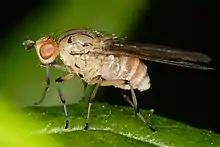 | |
| Homoneura sp. | |
| Scientific classification | |
| Domain: | Eukaryota |
| Kingdom: | Animalia |
| Phylum: | Arthropoda |
| Class: | Insecta |
| Order: | Diptera |
| Section: | Schizophora |
| Subsection: | Acalyptratae |
| Superfamily: | Lauxanioidea |
| Family: | Lauxaniidae Macquart, 1835 |
| Subfamilies | |
| |
| Synonyms | |
|
Sapromyzidae | |
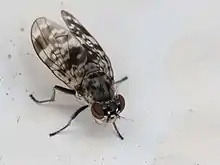
The Lauxaniidae are a family of acalyptrate flies. They generally are small flies (length 7 mm or less) with large compound eyes that often are brightly coloured in life, sometimes with characteristic horizontal stripes, such as in Cestrotus species. Many species have variegated patterns on their wings, but in contrast they generally do not have variegated bodies, except for genera such as Cestrotus, whose camouflage mimics lichens or the texture of granitic rocks.
Some 1800 species of Lauxaniidae have been described and they comprise some 126 genera. The family has a cosmopolitan distribution, most of the species occurring in tropical regions of Asia and the Americas; relatively few species occur in Afrotropical regions, and Lauxaniid species diversity declines strongly towards the more temperate regions; for example fewer than 200 European species have been described. Most species inhabit forests, where the adults usually are found sitting on leaves of the understory. They are far less common in open country, such as grassland habitats.[2]
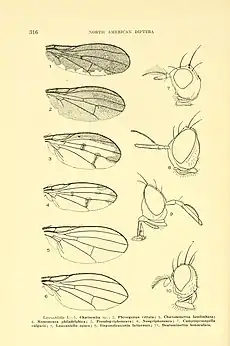
Description
For terms, see Morphology of Diptera
Lauxaniidae are small flies (2–7 mm in length). They are often rather plump, dull, or partly lustrous flies. The body colour varies from yellow to brown or black, or with a combination of these colours. The head is variable in shape, the face projecting or retreating, convex, flat or concave, usually without oral vibrissae (sometimes poorly developed, occasionally strong bristles near the vibrissal angle). The postvertical bristles converge (in rare cases parallel). The frons is wide, with two pairs of frontal bristles, the upper pair of which is always reclinate, the lower pair sometimes decussate. Interfrontal bristles are absent. The ocellar bristles are present or minute. The antennae are variable and the arista is plumose, pubescent to bare. The thorax has bristles, at least behind the suture. The scutellum is usually bare except for the marginal bristles. Propleural bristles are present or absent and one or two sternopleural bristles are seen. Tibiae all have a preapical bristle. The wings are marked or unmarked (in a number of species with spots along the veins). The wing venation is complete and the costa is continuous. The subcosta is entire and ends in the costa. The second basal and anal cells are short and the apical cell usually widely open. The abdomen is oval, rarely elongated.
Biology
The larvae are mostly saprophagous, feeding in leaf litter, soil, bird nests, etc. Larvae of some mine fallen leaves, others live in rotten wood, and some cause deformation of the flowers and pistils of violets.
Genera
- Afrominettia Stuckenberg, 1971[3]
- Agriphoneura Hendel, 1925[4][5]
- Allogriphoneura Hendel, 1926[5]
- Allominettia Hendel, 1925[4][5]
- Amblada Walker 1860[6]
- Arnomyia Malloch, 1925[7]
- Asilostoma Hendel, 1925[4][5]
- Aulogastromyia Hendel, 1925[5]
- Baliopteridion Papp & Silva, 1995[8]
- Calliopum Strand, 1928[9]
- Camptoprosopella Hendel, 1907[10]
- Cestrotus Loew, 1862[11]
- Choryeuromyia Gaimari & Silva, 2010[1]
- Cnemacantha Macquart, 1835
- Deceia Malloch, 1923[12]
- Deutominettia Hendel, 1925[5]
- Elipolambda Gaimari & Silva, 2020[13]
- Eurychoromyia Hendel, 1910[1]
- Euryhendelimyia Gaimari & Silva, 2010[1]
- Eurystratiomyia Gaimari & Silva, 2010[1]
- Eusapromyza Malloch, 1923[12]
- Exalla Gaimari, 2011[14]
- Gauzania Walker, 1856
- Gibbolauxania Papp & Silva, 1995[8]
- Griphoneura Schiner, 1868
- Griphoneuromima Gaimari & Silva, 2020[13]
- Hirtodeceia Shewell, 1986[15]
- Homoneura Wulp, 1891
- Lauxania Latreille, 1804
- Luzonomyza Malloch, 1925
- Mallochomyza Hendel, 1925[5]
- Marmarodeceia Shewell, 1986[15]
- Meiosimyza Hendel, 1925[5]
- Melanomyza Malloch, 1923[12]
- Meraina Gaimari & Silva, 2020[13]
- Minettia Robineau-Desvoidy, 1830[16]
- Minilauxania Papp & Silva, 1995[8]
- Mycterella Kertész, 1912
- Myzaprosa Gaimari & Silva, 2020[13]
- Neodeceia Malloch, 1924
- Neogeomyza Séguy, 1938[17]
- Neogriphoneura Malloch, 1924
- Neoparoecus Özdikmen & Merz, 2006[18]
- Oncodometopus Shewell, 1986[15]
- Pachycerina Macquart, 1835
- Pachyopella Shewell, 1986[15]
- Paradeceia Gaimari & Silva, 2020[13]
- Paranomina Hendel, 1907[10]
- Parapachycerina Stuckenberg, 1971[17][19]
- Peplominettia Szilády, 1943
- Peplomyza Haliday, 1837
- Physegeniopsis Gaimari & Silva, 2010[1]
- Physegenua Macquart, 1848
- Physoclypeus Hendel, 1907[10]
- Poecilolycia Shewell, 1986[15]
- Poecilominettia Hendel, 1932
- Prosopomyia Loew, 1856
- Pseudocalliope Malloch, 1928
- Pseudodeceia Gaimari & Silva, 2020[13]
- Pseudominettia Papp & Silva, 1995[8]
- Roryeuchomyia Gaimari & Silva, 2010[1]
- Sapromyza Fallén, 1810
- Sapromyzosoma Lioy, 1864
- Sciasminettia Shewell, 1986[15][20]
- Sericominettia Gaimari & Silva, 2020[13]
- Steganolauxania Frey, 1918
- Stenolauxania Malloch, 1926 [21]
- Tauridion Papp & Silva, 1995[8]
- Tricholauxania Hendel, 1925[5]
- Trigonometopus Macquart, 1835
- Trisapromyza Shewell, 1986[15]
- Trivialia Malloch, 1923[12]
- Trypetisoma Malloch, 1924
- Wawu Evenhuis 1989[22]
- Xangelina Walker 1856[23]
- Xeniconeura Shewell, 1986[15]
- Xenochaetina Malloch, 1923[12]
- Xenopterella Malloch, 1926[21]
- Zamyprosa Gaimari & Silva, 2020[13]
- Zargopsinettia Gaimari & Silva, 2020[13]
Gallery
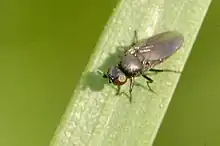
 Cestrotus, eyes with horizontal stripes as in many Lauxaniidae
Cestrotus, eyes with horizontal stripes as in many Lauxaniidae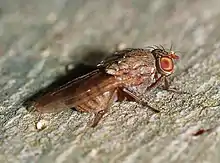
- Video: female of the Minettia fasciata group
 Prosopomyia pallida
Prosopomyia pallida
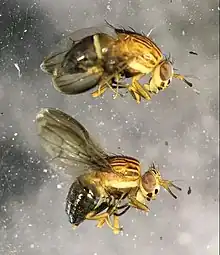
 Wawu queenslandensis
Wawu queenslandensis
References
- 1 2 3 4 5 6 7 Gaimari, Stephen D. &; Silva, Vera C. (2010). "Revision of the Neotropical subfamily Eurychoromyiinae (Diptera: Lauxaniidae)" (PDF). Zootaxa. Auckland: Magnolia Press. 2342: 1–64. doi:10.11646/zootaxa.2342.1.1. hdl:11449/2764. ISSN 1175-5334. S2CID 3976247. Retrieved 22 September 2012.
- ↑ Merz, Bernhard (2004). "Revision of the Minettia fasciata species-group (Diptera, Lauxaniidae)" (PDF). Revue Suisse de Zoologie. Geneva: Muséum d'histoire naturelle. 111 (1): 183–211. doi:10.5962/bhl.part.80234.
- ↑ Stuckenberg, B. R. (1971). "A review of the Old World genera of Lauxaniidae (Diptera)". Annals of the Natal Museum. 20 (3): 499–610.
- 1 2 3 Ibáñez-Bernal, Sergio; Hernández-Ortiz, Vicente (2010). "76". In Brown, B.V.; Borkent, A.; Cumming, J.M.; Wood, D.M.; Woodley, N.E.; Zumbado, M. (eds.). Manual of Central American Diptera (Print). Vol. 2. Ottawa, Canada: NRC Research Press. pp. 1025–1030. ISBN 978-0-660-19958-0.
- 1 2 3 4 5 6 7 8 9 Hendel, F. (1925). Neue Ubersicht uber die bisher bekannt gewordenen Gattungen der Lauxaniiden, nebst Beschreibung neuer Gattungen u. Arten. Arten. Encycl. Ent. (B II) Diptera. pp. 103–112.
- ↑ Walker, Francis (1860). "Catalogue of the dipterous insects collected at Makessar in Celebes, by Mr. A. R. Wallace, with descriptions of new species". Journal of the Proceedings of the Linnean Society. Zoology. London: The Linnean Society. 4 (14): 90–96. doi:10.1111/j.1096-3642.1859.tb00089.x.
- ↑ Malloch, John Russell (1929). "Exotic Muscaridae (Diptera).—XXVI". Annals and Magazine of Natural History. 4 (10): 97–120. doi:10.1080/00222932908673032.
- 1 2 3 4 5 Papp, L.; Silva, Vera.C. (1995). "Seven new genera of the Neotropical Lauxaniidae (Diptera)". Acta Zoologica Academiae Scientiarum Hungaricae. 41 (3): 185–208.
- ↑ Шаталкин, Анатолий Иванович (2000). Определитель палеарктических мух семейства Lauxaniidae (Diptera) [Keys to the Palaearctic flies of the family Lauxaniidae (Diptera)] (Print) (in Russian). Vol. 5. Moscow: Zoologicheskie Issledovania. p. 102.
- 1 2 3 Hendel, Friedrich (1907). "Neue und interessante Dipteren aus dem kaiserl. Museum in Wien. (Ein Beitrag zur Kenntnis der acalyptraten Musciden.)". Wiener Entomologische Zeitung. 26: 223–245, 1 pl. doi:10.5962/bhl.part.8886. Retrieved 28 January 2021.
- ↑ SHI LI (China), DING YANG (China) & STEPHEN D. GAIMARI (USA). Species of the genus Cestrotus Loew from China (Diptera: Lauxaniidae) Zootaxa 2009: 41-68 (11 Feb. 2009) ISSN 1175-5334 (online edition
- 1 2 3 4 5 Malloch, John Russell (1923). "Some new genera and species of Lonchaeidae and Sapromyzidae (Diptera)". Proceedings of the Entomological Society of Washington. 25: 45–53. Retrieved 28 January 2021.
- 1 2 3 4 5 6 7 8 9 Gamiari, S.D.; Silva, V.C. (2020). "A conspectus of Neotropical Lauxaniidae (Diptera: Lauxanioidea)". Zootaxa. Magnolia Press. 4862 (1): zootaxa.4862.1.1. doi:10.11646/zootaxa.4862.1.1. PMID 33311202. S2CID 226326318. Retrieved 28 January 2021.
- ↑ Gaimari, S.D. (2011). "An unusual new genus of eurychoromyiine Lauxaniidae (Diptera)". The Canadian Entomologist. 143 (6): 594–611. doi:10.4039/n11-039. S2CID 84395018.
- 1 2 3 4 5 6 7 8 Shewell, G.E. (1986). "New American genera of Lauxaniidae, based on species of earlier authors, and a note on Lyciella rorida (Fallen) in North America (Diptera)". The Canadian Entomologist. 118 (6): 537–547. doi:10.4039/Ent118537-6. S2CID 87063435.
- ↑ Robineau-Desvoidy, André Jean Baptiste (1830). "Essai sur les myodaires". Mémoires presentés à l'Institut des Sciences, Lettres et Arts, par divers savants et lus dans ses assemblées: Sciences, Mathématiques et Physique. 2 (2): 1–813. Retrieved 15 July 2018.
- 1 2 Davies, Gregory B. P.; Miller, Raymond M. (2008). "Revision of the Afrotropical species of Parapachycerina (Diptera: Lauxaniidae)". African Invertebrates. Pietermaritzburg: Council of the KwaZulu-Natal Museum. 49 (2): 131–158. doi:10.5733/afin.049.0208.
- ↑ Özdikmen, H.; Merz, B. (2006). "Neoparoecus nom. nov., a replacement name for the preoccupied genus name Paroecus Becker, 1895 (Diptera, Lauxaniidae". Mitteilungen der Schweizerischen Entomologischen Gesellschaft (Print). Société Entomologique Suisse. 79 (1–2): 63–64.
- ↑ Stuckenberg, B.R. (1971). "A review of the Old World genera of Lauxaniidae (Diptera)". Annals of the Natal Museum (Print). Natal: the Natal Museum. 20 (3): 499–610.
- ↑ Carles-Tolrá, M. (2006). "Sciasminettia Shewell, 1971: a new lauxaniid genus for Europe, with description of a new species and a key to known species (Diptera: Lauxaniidae)". Heteropterus Revista de Entomología. Gipuzkoa: Heteropterus. 6: 9–14. ISSN 1579-0681. Archived from the original (PDF) on 2016-01-12.
- 1 2 Malloch, John Russell (1926). "New genera and species of Acalyptrate flies in the United States National Museum" (PDF). Proceedings of the United States National Museum. 68 (21, #2622): 35 pp., 2 pls. Retrieved 13 October 2019.
- ↑ Evenhuis, Neal L.; Okadome, T. (1989). "Family Lauxaniidae" (PDF). Catalog of the Diptera of the Australasian and Oceanian Regions. Hawai'i': The Bishop Museum Press: 576–589. Retrieved 19 September 2017.
- ↑ Walker, Francis (1856). "Catalogue of the dipterous insects collected in Singapore and Malacca by Mr. A.R. Wallace, with descriptions of new species". Journal of the Proceedings of the Linnean Society. Zoology. London: The Linnean Society. 1: 4–39. doi:10.1111/j.1096-3642.1856.tb00943b.x.
- ↑ Walker, Francis (1856). "Catalogue of the Dipterous Insects collected at Sarawak, Borneo, by Mr. A. R. Wallace, with Descriptions of New Species". Journal of the Proceedings of the Linnean Society of London. Zoology. 1 (3): 119. doi:10.1111/j.1096-3642.1856.tb00964.x.
Further reading
- Evenhuis, N.L., and T. Okadome. 1989. Family Lauxaniidae, pp 576–589. In Evenhuis, N.L. (ed.), Catalog of the Diptera of the Australasian and Oceanian Regions. E.J. Brill, Leiden. 1155 pp.
Identification
- Czerny. 1932. Lauxaniidae.In: Lindner, E. (Ed.). Die Fliegen der Paläarktischen Region , 5, 50, 1-76. Keys to Palaearctic species but now needs revision (in German).
- Papp, L. 1978a Contribution to the revision of Palaearctic Lauxaniidae (Diptera). Annales historico naturales Musei nationalis Hungarici 70: 213–231.
- Papp, L. 1984. Lauxaniidae (Diptera), new Palaearctic species and taxonomic notes. Acta Zoologica Hungarica 30: 157–179.
- Papp, L. & Shatalkin, A.I., 1998 Family Lauxaniidae. In: Papp, L. & Darvas, B. (Eds.), Contributions to a Manual of Palaearctic Diptera. Volume 3, Higher Brachycera. Science Herald Publishers, Budapest, pp. 383–400
- Séguy, E. (1934) Diptères: Brachycères. II. Muscidae acalypterae, Scatophagidae. Paris: Éditions Faune de France 28. virtuelle numérique
- Shatalkin, A.I. 2000. Keys to the Palaearctic flies of the family Lauxaniidae (Diptera). Zoologicheskie Issledovania 5: 1–102.
- Shtakel'berg, A.A. Family Lauxaniidae in Bei-Bienko, G. Ya, 1988 Keys to the insects of the European Part of the USSR Volume 5 (Diptera) Part 2 English edition.Keys to Palaearctic species but now needs revision .
Species lists
External links
 Data related to Lauxaniidae at Wikispecies
Data related to Lauxaniidae at Wikispecies- Family Lauxaniidae at EOL image gallery
- Diptera.info image gallery
- BugGuide image gallery
- Lauxaniidae of Fiji Many images of types.
- Family descriptions
- Wing venation